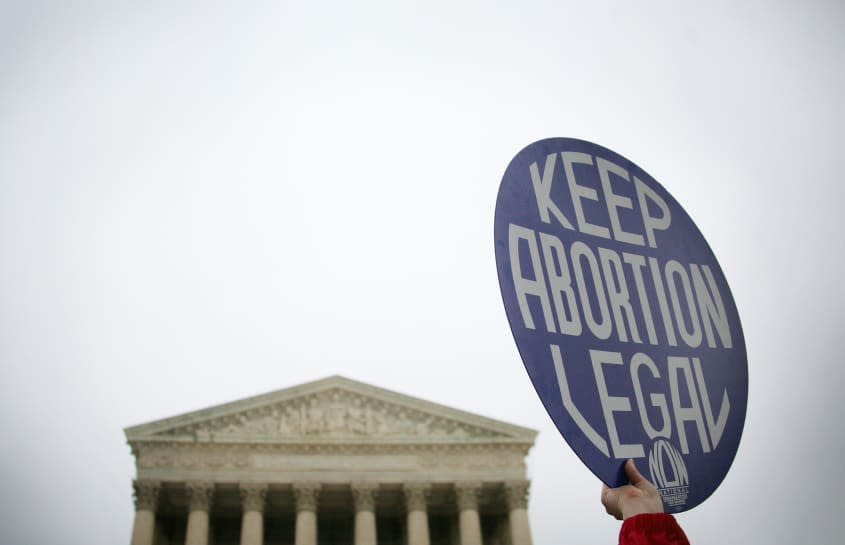Why Republicans are worried about Wisconsin's Supreme Court

- Oops!Something went wrong.Please try again later.
Milwaukee County Judge Janet Protasiewicz last week defeated former Supreme Court Justice Dan Kelly to win a spot on Wisconsin's Supreme Court, giving the state's highest court its first liberal majority in 15 years. Seats on the court are officially nonpartisan, but Protasiewicz touted her support for abortion rights during the campaign, and received the endorsement of Democrats. Kelly, a conservative, was backed by Republicans and anti-abortion groups.
The race broke spending records and became a referendum on last year's Dobbs decision by the U.S. Supreme Court that overturned Roe v. Wade, the ruling that established and protected a constitutional right to abortion for half a century. Wisconsin's new liberal majority could overturn laws championed by the right, including the state's 19th-century-era abortion ban. "Today I'm proud to stand by the promise I've made to every Wisconsinite that I will always deliver justice and bring common sense to our Supreme Court," Protasiewicz told supporters. "Our state is taking a step forward to a better and brighter future where our rights will be protected."
Kelly said he respected the result but refused to call Protasiewicz to concede, saying her partisan appeals on issues like abortion and redistricting "demeaned the judiciary." "I wish, in a circumstance like this, I would be able to concede to a worthy opponent. But I do not have a worthy opponent to which I can concede," Kelly said. "I wish Wisconsin the best of luck, because I think it's going to need it."
A wake-up call for the GOP?
"Republicans should be on the march," said Kimberley Strassel in The Wall Street Journal, given that the economy is on the brink of recession, the border's a mess, and crime is rising. Instead, "an out-and-out progressive judge" trounced her conservative opponent by 10 points in a state Donald Trump carried in 2016, and "where Republicans control both chambers of the state legislature." And Protasiewicz "easily seized the swing seat" on the high court by running "unapologetically on abortion at a time when a pending lawsuit challenges an 1849 law banning the procedure." In election after election, swing voters are showing they "want a middle position" on abortion, but the right refuses to "unwax" its ears and keeps pushing for more and more restrictions.
There's a good reason Republicans are starting to freak out about voters' demand to restore abortion rights, said Michelle Goldberg in The New York Times. "Having made the criminalization of abortion a central axis of their political project for decades, Republicans have no obvious way" to change their message now. "A decisive majority of Americans — 64 percent, according to a recent Public Religion Research Institute survey — believe that abortion should be legal in most cases," but "a decisive majority of Republicans" want the procedure banned. The "end of Roe has awakened a previously complacent pro-choice majority" that is winning elections, and the Republican Party can't "jettison" its old anti-abortion passion, which is suddenly a liability, "without tearing itself apart."
Republicans need new leadership
"If Republicans were serious about winning Arizona, Georgia, and Wisconsin in 2024 and thus the White House," they would get serious about winning over suburban voters, said Matthew Continetti in The Washington Free Beacon. That means adding "white voters with college degrees and suburban America atop their noncollege rural base." But the GOP has lost its advantage in the suburbs in the Trump era. Turning that around will require replacing "Donald Trump as party leader," and finding "a nominee who is pro-life and who can speak about abortion restrictions — with exceptions for rape, incest, and life of the mother — in a nonthreatening way." That's the lesson of the Wisconsin vote, and "of every election cycle since 2016."
Not quite, said the Los Angeles Times in an editorial. The lesson is that voters want to "protect the rights the Supreme Court wouldn't." When the Supreme Court overturned Roe and "took away the constitutional right to abortion, it left it up to the states — and the voters of those states — to protect reproductive rights." And that's precisely what voters in states across the nation intend to do. It was unusual to see a judicial race turn so partisan, but Protasiewicz's honesty in talking about her pro-choice views was refreshing after listening to Brett Kavanaugh insist in his confirmation hearing that Roe was settled law, only to vote to "take away a constitutional right" once he was on the Supreme Court. "This is the post-Roe world in which we live."
You may also like
Millie Bobby Brown appears to announce engagement to Jon Bon Jovi's son
Leaker of damaging U.S. intelligence files was reportedly administrator of a Discord chat room
NASA unveils 3D-printed Mars habitat where 4 people will live for a year

